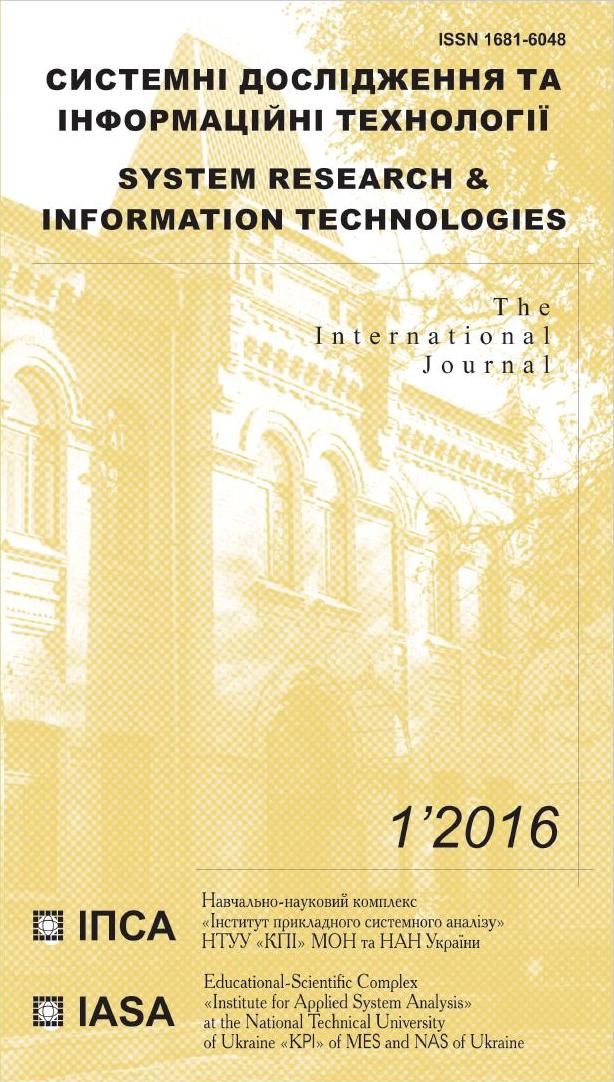Some deterministic models of fuzzy linear programming problems
DOI:
https://doi.org/10.20535/SRIT.2308-8893.2016.1.12Abstract
We consider deterministic equivalents of various formulations of linear programming prob-lems, in which the coefficients of the objective function, constraints and the boundary values of the variables of the problem and the right-hand side are represented by fuzzy sets. The methods for comparing the fuzzy sets and selecting the best ones are proposed. The problem of finding the vec-tor of variables as a vector of real numbers is reduced to solving the one-criterion or multicriteria problem with the significantly large number of constraints. In solving the problem as a vector of Fuzzy-sets, the equivalent problem was determined – a sequence of linear programming problems. The formulated problems can be solved by the simplex method.References
Jazenin A.V. Nechetkoe matematicheskoe programmirovanie / A.V. Jazenin. — Kalinin: Kalin. gos. un-t, 1986. — 60 s.
Zgurovskij M. Modeli i metody prinjatija reshenij v nechetkih uslovijah / M. Zhurovskyj, Ju. Zajchenko. — K.: Nauk. dumka, 2013. — 275 s.
Kumar A. A new method for solving fully fuzzy linear programming problems / A. Kumar, J. Kaur, P. Singh // Applied Mathematical Modelling. — 2011. — 35. — N 2. — P. 817–823.
Kumar A. Fuzzy optimal solution of fully fuzzy linear programming problems with inequality constraints / A. Kumar, J. Kaur, P. Singh // International Journal of Applied Mathematics and Computer Sciences. — 2010. — 6. — P. 37–41.
Rommelfanger H.J. Entscheiden bei Unsch?rfe. Fuzzy Decision Support-Systeme / H.J. Rommelfanger // Springer, Berlin-Heidelberg. — New York, London, Tokio, 1999. — 304 p.
Herrera F. Thtree models of fuzzy integer linear programming / F. Herrera, J.L. Verdegay // European Journal of Operationel Research. — 1995. — N 83. — P. 581–593.
Allahviranloo F. Solving fully fuzzy linear programming problem by the ranking functhion / F. Allahviranloo, H. Lotfi, M.K. Kiasary, N.A. Kiani, L. Alizadeh // Applied Matematical Sciences. — 2008. — 2. — P. 19–32.
Maleki R. Linear programming with fuzzy variables / R. Maleki, M. Tata, M. Mashinchi // Fuzzy Sets and Systems. — 2000. — 109. — P. 21–33.
Zak Ju.A. Prinjatie reshenij v uslovijah razmytyh i nechetkih dannyh / Ju.A. Zak. — M.: URSS, 2013. — 352 s.
Inguichi M. Possibilistic linear programming: a brief review of fuzzy mathematical programming and a comparison with stochastic programming in portfolio selection problem / M. Inguichi, J. Ramik // Fuzzy Sets and System. — 2000. — N 11. — P. 3–28.
Barth P. A Davis-Putnam Based Enumeration Algorithm for Linear Pseudo-Boolean Optimization / P. Barth // Max-Plank-Institut f?r Informatik, Saarbr?cken, 1995. — 12 p.
Zak Ju.A. Kriterii i metody sravnenija nechetkih mnozhestv / Ju.A. Zak // Sistemnye issledovanija i informatsionnye tehnologii. —2013. — № 3. — S. 58–68.
Zak Ju.A. Algoritmy reshenija zadach linejnogo bulevogo programmirovanija v uslovijah razmytyh ishodnyh dannyh / Ju.A. Zak // Programmnaja inzhenerija. — 2014. — № 4. — S. 28–38.
Zak Ju.A. Prikladnye zadachi mnogokriterial'noj optimizatsii / Ju.A. Zak // Ekonomika. — 2014. — 452 c.
Zak Ju.A. Mnogokriterial'nye zadachi matematicheskogo programmirovanija s razmytymi ogranichenijami. Matematicheskie modeli shem kompromissa. Vybor reshenij iz konechnogo mnozhestva al'ternativ / Ju.A. Zak // Kibernetika i sistemnyj analiz. — № 5. — 2010. — S. 80–89.
Bellman R.E. Decision-Making in Fuzzy Environment / R.E. Bellman, L.A. Zadeh // Management Science. — 1970. — 17. — N 4. — P.141–160.

